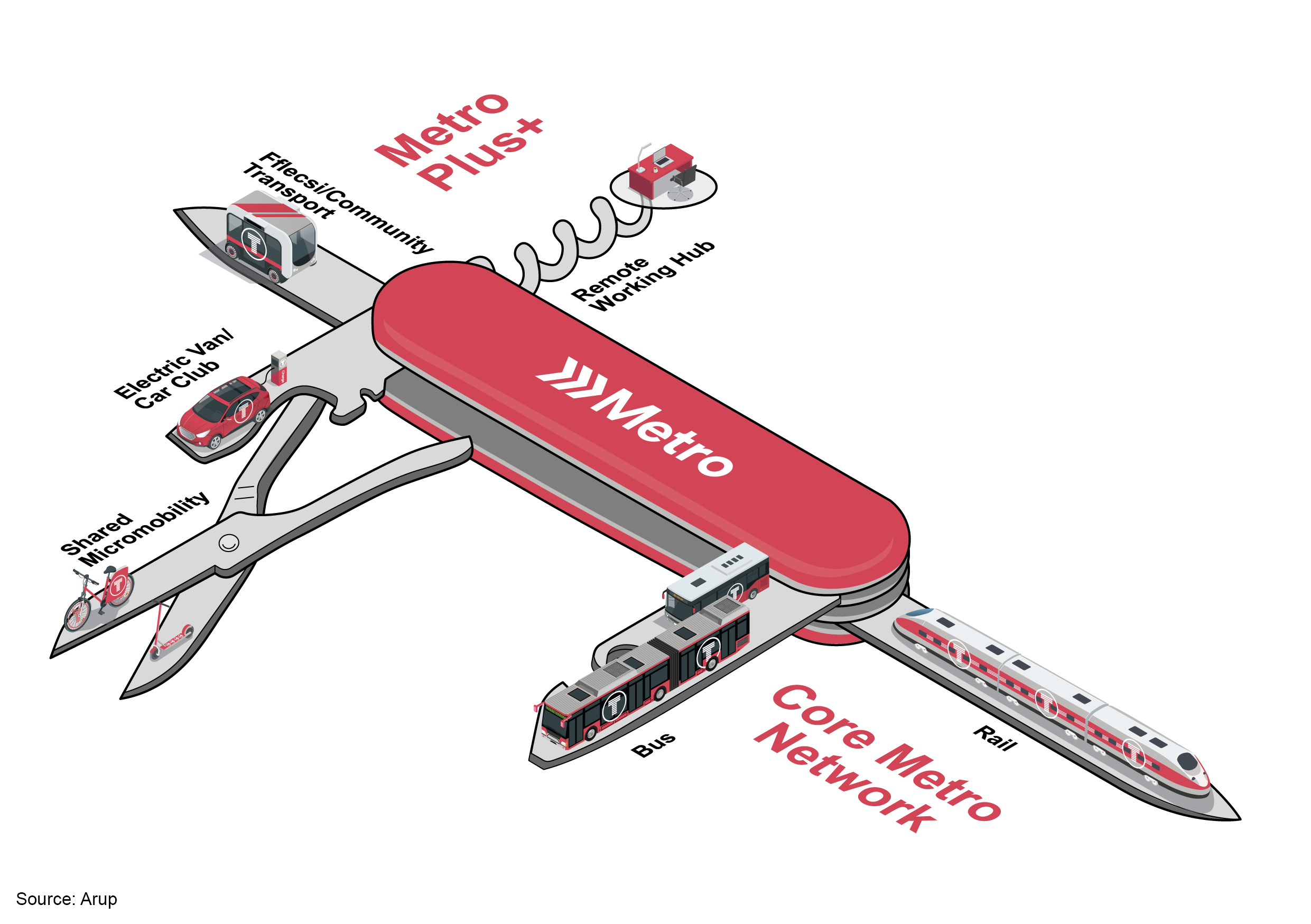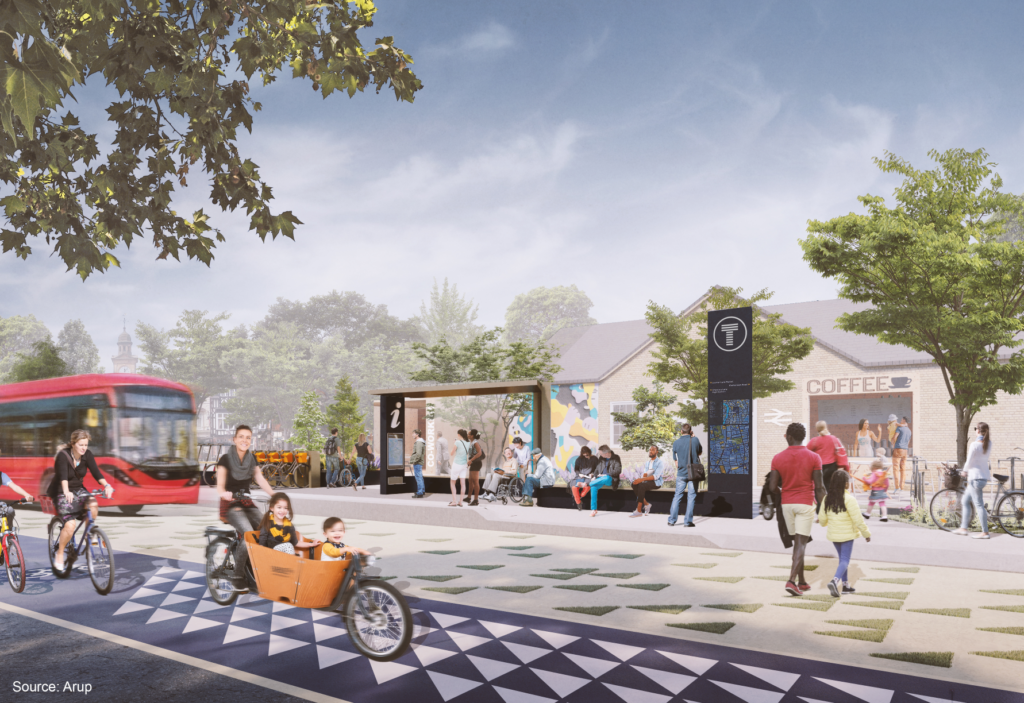Daniel McCool argues that the people of Wales should have access to active travel and public transport facilities as easy and convenient to use as private cars.
Metro Plus+ would allow users to plan and use the right tool for their journey
To encourage people to make the change to more sustainable transport as set out in Welsh Government’s Llwybr Newydd, we must make low-carbon, door-to-door, sustainable transport options more attractive and more affordable, by adopting innovations that make them easier to use.
Shared mobility refers to a hybrid model of publicly-available transport modes such as car clubs, shared bikes or e-scooters that can be accessed as and when needed by users, for private trips –typically via a mobile app. Bringing these transport options together with high-frequency fixed route services, under a consistent Metro brand, could build trust in public transport services by providing customers with seamless journeys and a single source of information.
As the cost-of-living crisis spirals and fuel prices spike, more and more of us are finding it difficult to meet our transport needs in an affordable way.
With a Swiss Army knife of transport options, Metro customers could select the best tool to meet the specific needs of their journey – to use an active mode as a warm-up for the gym, to use the bus on days when the weather is bad, or to use short-term car or van hire to make a trip to the out-of-town retail centre when buying furniture or bulky goods.

Action to address the rising cost of living must be aligned with net zero
Taking collective action to address the climate emergency and deliver a wellbeing economy are key priorities of the Welsh Government. According to Net Zero Wales, transport is one of the biggest sources of greenhouse gas emissions in Wales, accounting for 17% of emissions in 2019. We are running out of time to change the way we think and behave if we are to meet the goal of net-zero.
Meanwhile, as the cost-of-living crisis spirals and fuel prices spike, more and more of us are finding it difficult to meet our transport needs in an affordable way. For low-income groups, private car ownership can represent a cost equal to housing, consuming a large share of income. In addition to enabling sustainable travel behaviour, empowering households to adopt car-light lifestyles could offer significant household savings – recent academic research has calculated that the average lifetime cost of a car is around £350,000.
Shared mobility means public transport can serve more people and provides alternatives during times of disruption to bus or rail services
Shared mobility can work alongside fixed-route public transport services to extend the reach of the network, providing first and last mile connections to rail stations and bus stops. Additionally, shared mobility options provide resilience during times of disruption by offering an alternative when public transport isn’t available. Combining shared mobility and core public transport services in this way can better suit the needs of individual users’ journeys and bring public transport closer to the convenience of cars.
Using a digital platform to plan and pay for journeys (more commonly referred to as ‘Mobility as a Service’) can further improve the passenger experience. Equally, mobility hubs can provide facilities for combining shared mobility trips with public transport – making interchange between modes of transport easier. These provisions can make good transport systems even better, but they cannot compensate for low levels of service.
Cars represent a grossly inefficient use of space, spending 92% of their time parked and doing nothing.
In comparison with the investment being made in public transport improvements in Wales, shared mobility is in its infancy. NextBike schemes in Cardiff and Penarth are some of the most successful in the UK but are not available in many other parts of Wales. E-scooter schemes are not currently being trialled in Wales but it is becoming clear that they will form part of the UK’s future transport mix. Shared micromobility schemes, such as cycle and scooter hire, at public transport stations have significant potential to extend the reach of public transport, without passengers needing to buy, store or transport their own bike or scooter. Car clubs too have their place in a multi-modal transport network for when public or active travel is not an option. In isolation, these form factors are unlikely to replace all car trips, but in combination they can provide a system that is greater than the sum of its parts, facilitating door-to-door connectivity for customers and facilitating journeys from the first to last mile.
Shared mobility supports 15-minute neighbourhoods and low car neighbourhoods
Supporting households to reduce car use in this way would have benefits beyond cutting the cost of one of the most expensive household consumer goods. Cars represent a grossly inefficient use of space, spending 92% of their time parked and doing nothing. Increasing utilisation through sharing of vehicles can reduce the need for parking and can result in opportunities to redesign and improve the public realm, allowing for more human-scale use of previously car-dominated spaces. Research in Europe by the International Transport Forum has shown that widespread adoption of shared mobility would reduce the space required for car parking by 95% and reduce transport carbon emissions by 60%.
More locally, research by CoMoUK highlights that each car club vehicle in the UK replaces 20 private cars. Imagine if twenty cars on your street could be replaced with one. More space for children to play safely and spaces for social interaction, supporting thriving communities and better livelihoods for all. Shared mobility can also enable car-free developments and support higher-density developments around transport nodes – both critical to solving the housing crisis and delivering place-based decarbonisation.
Conclusion
Shared mobility could be a key tool in facilitating a timely and just transition to net-zero, by lowering the barriers to entry for zero-emission transport when compared with privately-owned cars. Transport decarbonisation will happen faster and more fairly if everyone has access to public transport and shared mobility.
Of course, widening access to shared mobility will be highly context specific. Like any good penknife, the mix of tools will vary depending on local characteristics. A national strategy for enhancing shared mobility options, informed by a better understanding of what customers expect from Metro, could support a scalable approach to delivery. Partnerships with operators in the private sector will play an important role, as will the need for subsidy in lower-density and rural areas. But, we are in a climate emergency, and we must treat it as such – diverting investment from extensive road-building projects and introducing demand-management measures for cars, such as road-user charging, all form part of the mix and could drive further behaviour change.
Compared to programmes requiring significant infrastructure, a Metro Plus+ programme would act as an enabler for rapid change in our travel behaviour and increase the pace of transport decarbonisation in Wales. At a time when the energy prices and cost of living crises are making people re-consider their personal travel choices – now, more than ever, is the time.
All articles published on the welsh agenda are subject to IWA’s disclaimer.





